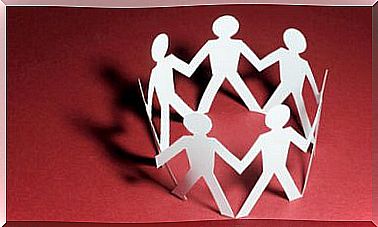Five Signs You Are Selfish And How To Change

As humans, we are set up to take care of ourselves. However, there is a big difference between taking care of yourself and being selfish.
Thinking of yourself is not incompatible with generosity, altruism and solidarity. In the society we live in now, there are many benefits to be gained from altruism and generosity. Benefits so intrinsic that they will keep us motivated.
Many feel that they must be selfish because others are, and society creates a lot of insecurity. However, choosing to live a more generous life and show more interest in others, living less individualistic, is the best way to attract new opportunities.
How do you know if you are selfish
Humans are naturally selfish, which arose from our survival instinct. But compassion arose in the same way. Ultimately, humans as a race probably wouldn’t be able to survive if they didn’t have the necessary skills to form partnerships with others.
In this way , it is necessary to redefine selfishness and to find the balance between our own interests and those of others.

1. Don’t understand the benefits of generosity?
In fact, taking into account the general interest or the good of others can also be called somewhat selfish, because in theory the good for the group or the other usually also benefits the individual.
A selfish person is unable to see the benefits of sharing his time, knowledge, or resources with others. Selfish people think that only things that benefit themselves really bring benefits or, worse, that it is better to take advantage of something yourself than to have to share it with others.
2. Do you get nervous when you’re out of control?
Keeping control is a good thing, but what happens when the other person is in control? What happens when you rely on others? Can you accept the responsibility of another in a positive way? Can you respect and give in to that decision?
For selfish people, the contributions and needs of others are less important or valuable than their own.
Selfish people should have control over everything they directly and indirectly deal with. That obsession with control makes them overly critical of others and keeps them mentally wrapped around anything that has to do with sharing responsibilities or losing control to some degree.

3. Do you find it difficult to work in a group?
Collaboration requires the ability to listen, make commitments, and accept the opinions and proposals of others. This is closely related to the obsession with maintaining control that we mentioned in the previous point. In this sense, the inability to work as a team could indicate a problem with selfishness.
Collaborative intelligence or collective intelligence is essential for anyone who is in a social environment. That’s why collaboration is so important in every way, from learning to business expansion.
We can achieve more when we work together, when everyone contributes what they can and puts themselves at the service of others so that others can further explore and expand their knowledge. A selfish person cannot see this because he thinks he loses when others earn, when in fact we all win.
4. Do you find it difficult to take the blame?
Bypassing the error is a standard way of settling something that went wrong. Behind a person who is unable to take his or her responsibility is probably a selfish person who only knows how to avoid repression and make sure that he doesn’t appear bad himself.
However, taking responsibility is actually very liberating, just like accepting a mistake made by others without judgment or humiliation. Accepting responsibility without the burden of guilt is an act of grace to yourself and helps you become more generous to others when needed.
5. Do you feel that it is never enough and you want more every time?
If you are a person who is not satisfied with what he already has, your main concern will always be having more, which automatically makes the needs of others for you fade into the background. A person who does not value what he has feels unhappy and poor, and is unable to see the value of certain things which, while insignificant, are precisely what he really needs.

Behind someone who is superficial and materialistic is usually a selfish person who is only interested in his or her own material needs and therefore despises and/or ignores the needs of others, including his or her own spiritual needs.









